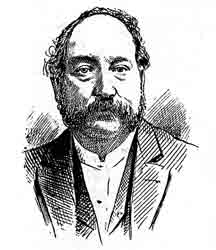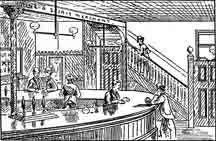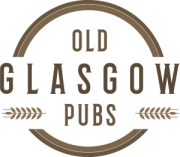43 Argyle Street, Glasgow.

Mr George Buchanan. 1887.
George Buchanan took over the Rob Roy Vaults at 43 Argyle Street which was famous for it’s luncheons, hungry Glaswegian’s traveled for miles for his delicious meals. George got his cooking experience during his time catering for the passengers on the steam trains at St. Enoch Station. Mr Buchanan employed Robert Stoddart probably the best known barman of that time he was also a keen actor. A menu hung outside the Rob Roy serving: Soups– Kidney, ox-tail, brown and carrot. Joints with veg, Roast beef, Stewed rabbit, Irish stew, Roast mutton, Steak pie, & Hot snacks
George Buchanan’s cuisine and liquors were one of the best in town.
In 1888 Mr Buchanan sold the Rob Roy to John Ramsay Stevenson for £1000. Mr Stevenson made some alterations, formerly two steps led to the entrance, but these were removed and the flooring lowered some two feet, thus giving a higher ceiling. One entering one was struck with a new mahogany horse shoe bar and spirit rack stocked with casks. The malt liquor was kept in the cellars, directly underneath and raised by a Bruce patent automatic beer raiser.
On the ground floor, large wall mirrors lined the walls, helping to give the bar a well lit appearance. Under the windows which faced the door was cushioned seats. The entrance had double doors, the inner door was of glass while a swinging door was further inwards, this helped to keep out the draughts when the other doors were kept open.
Under the stairs leading to the upper rooms was a tiled lined lavatory. In the main bar all the leading journals such as the Glasgow Herald, Scotsman, and Chronicle were kept. A new shop till was installed, one with five springs and sounds the alarm any time a stranger to the combination attempts to tamper with it.
Upstairs were four well furnished sitting rooms, each with ventilation, one large room was set up for Foresters meetings and other social gatherings. On this floor were three other spaces which were used for lighting the bar beneath but which could easily be converted into sitting rooms as required, lavatory accommodation was also here.

Interior view of the Rob Roy. 1888.
The well stocked cellars stocked all the usual beverages including Burton Ales, Younger’s, Nicholson’s, Gillespie’s. A large bottling rack was also down here, Mr Stevenson did all his own bottling. The Rob Roy famous old Irish Whiskey and Mr Stevenson’s fifteen year old brandy was very popular with his customers. In the next room was the wines in wood, brandies and other spirits. The cellars had large ceilings and deep under ground which helped to keep it very cool.
Mr Stevenson was assisted by his son William W Stevenson and two assistants. Mr Stevenson came from Shettleston, born in Old Shettleston Road, his father William was born, lived and died at the age of 70 years, in the same house, his mother was still living in 1888, she was 70 years old and spent all her days in the house. The property for hundreds of years belonged to the Lords Douglas.
Like the majority of Shettleston in those days, Mr Stevenson’s father was a weaver. Young John borrowed £40.00 from his father, on starting business he gave him a cheque for the amount, “Na, na,” said the old gentleman, “I will take nae bills.”
When John came to the city at an early age he was employed as cellar boy by Mr Wyper a well known publican in Glasgow but was soon managing one of the firms pubs. He left for a short while and joined the staff at a confectionary shop in the Saltmarket, this job didn’t fulfil his needs therefore saved a little money and borrowed from his father and friends to secure his first public house at 84 Ingram Street, “The Stevenson.”
Eight years later he took over another pub at 125-27 Green Street, Calton. In 1888 he took over the Rob Roy, Argyle Street and Springburn Road pubs followed. Mr Stevenson was born in 1848, he was twice married his first wife died at an early age, his second wife was a Springburn Lass who help in the family business.
The contractors for the alterations on the Rob Roy which totaled upwards of £300, were for Plumber work, Mr Wright, Mr McWhannel & Co., South Albion Street; Joiner work, Mr Breckenridge, Charlotte Street and the painting work was completed by John Burns jun., George Street.
End.

Leave a Reply